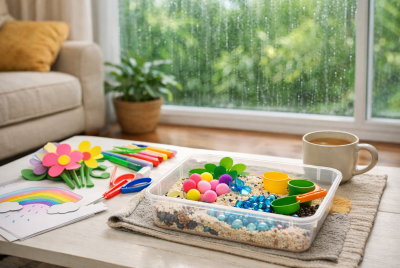How To Let Go Of Perfection – Embrace Authentic Parenting
We may earn a commission for purchases made using our links. Please see our disclosure to learn more.
Do you constantly feel like you’re falling short as a parent? You’re not alone. In a world saturated with parenting advice, Instagram-perfect families, and high-pressure expectations, it’s easy to feel like you’re not doing enough. But here’s the truth—authentic parenting isn’t about perfection. It’s about being real, present, and connected. Let’s explore how you can ditch perfectionism and start parenting in a way that’s not only healthier for your kids—but for you too.
The Pressure to Be a Perfect Parent
Parenting in the modern era frequently feels like a show. There’s a subtle race going on, from carefully planned playdates to Pinterest-worthy lunches, and it’s draining. Even while everyone wants the best for their kids, striving for perfection can sap your joy, deplete your energy, and damage your bond with your children.
An alternative is provided by authentic parenting. It urges you to be your complete, authentic self—flaws, emotions, and all—instead of striving to be a perfect parent.
What Is Authentic Parenting?
The goal of authentic parenting is to raise your children while remaining loyal to yourself. It entails being open about your emotions, establishing reasonable goals, and placing a higher value on genuine connection than on flawlessness or outward appearances.
Your goal is to assist your child become the best version of themselves, not to shape them into your vision of “success.”
Empathy, self-awareness, and acceptance are key components of this parenting approach. Although it’s not always simple, it’s incredibly fulfilling.

The Dangers of Perfectionism in Parenting
Perfectionism might seem like a noble goal, but it often leads to:
- Emotional burnout
- Unrealistic expectations for both parent and child
- Fear of failure, which stifles growth
- Disconnection from your child’s true needs
When you’re focused on doing everything right, you’re more likely to miss the real moments—the messy, beautiful chaos where connection truly happens.
Why Embracing Imperfection Builds Stronger Connections
Your kids don’t need a perfect parent. They need a present one.
When you allow yourself to be imperfect, you teach your children powerful lessons:
- It’s okay to make mistakes.
- Growth comes from vulnerability.
- Love isn’t conditional on achievement.
By showing your authentic self, you give them permission to do the same. That’s the foundation of trust and emotional safety.
How To Practice Authentic Parenting Daily
Start by Acknowledging Your Limits
You can’t pour from an empty cup. Admit when you’re tired. Ask for help. Set boundaries. These aren’t signs of weakness—they’re signs of wisdom.
Be Present Over Perfect
Instead of obsessing over getting everything right, focus on being fully present in the moment. Whether it’s a bedtime story or a messy kitchen chat—your presence matters far more than a perfect schedule.
Model Emotional Honesty
It’s okay to tell your child, “I’m feeling frustrated right now.” When you name your emotions calmly, you show them how to handle theirs. This teaches emotional intelligence by example.
Choose Connection Over Control
Rather than reacting with punishment, respond with curiosity. Ask what your child is feeling. Try to understand their perspective. Discipline rooted in empathy fosters cooperation—not fear.
Let Go of the Guilt: It’s Okay to Make Mistakes
Every parent loses their temper. Misses a moment. Says the wrong thing. What matters is what you do next. Apologize. Repair. Move forward.
Mistakes don’t ruin your relationship with your child. In fact, they give you opportunities to model humility and emotional repair—both powerful lessons.
Letting go of guilt doesn’t mean you don’t care. It means you’re learning to forgive yourself—and model grace. If you’re navigating a more complicated family dynamic, such as co-parenting with a narcissist, giving yourself that grace becomes even more essential.
What Research Says About Authentic Parenting and Perfectionism
While authentic parenting is rooted in emotional connection and mindfulness, science now backs what many parents already feel in their hearts—realness beats perfection. Here’s what recent research reveals:
Authentic Parenting Strengthens Self-Alignment
A 2022 study titled “Parenting Practices and Authenticity in Mothers and Fathers” found that authoritative parenting styles—those rooted in empathy, warmth, and healthy boundaries—help parents feel more authentic in their role. Interestingly, the study noted that when parents adopted methods that conflicted with their personal values (like authoritarian or overly permissive approaches), they experienced reduced feelings of self-alignment and authenticity.
In short, when you parent in a way that reflects who you truly are, you’re not just doing what’s best for your child—you’re doing what’s healthiest for yourself, too.
Parental Perfectionism Can Foster Unhealthy Expectations
Another study on the influence of parental perfectionism on child development sheds light on a growing concern: parents who hold themselves to unrealistically high standards may unintentionally transfer those perfectionistic expectations to their children. The findings linked parental perfectionism with increased anxiety, fear of failure, and disordered behaviors in kids.
This research highlights a crucial takeaway—letting go of perfection doesn’t just protect your peace of mind, it also safeguards your child’s emotional development.

Recommended Books and Products for Authentic Parenting
Want to dive deeper into authentic parenting? These handpicked books and tools offer insight, encouragement, and actionable strategies you can start using today.
- 📘 The Whole-Brain Child by Dr. Daniel J. Siegel & Tina Payne Bryson
A groundbreaking book that blends neuroscience with parenting strategies to foster emotional connection and cooperation. - 📗 Parenting from the Inside Out by Dr. Siegel
Learn how your childhood experiences shape your parenting style and how to become more self-aware as a parent. - 📕 The Conscious Parent by Dr. Shefali Tsabary
Encourages mindfulness and spiritual awareness in parenting by shifting the focus inward and nurturing parent-child connection. - 🧘 Mindfulness for Kids and Families Cards Set
A simple, playful tool for promoting mindfulness and calm moments with your children—perfect for daily routines.
Each of these supports your journey toward authentic parenting, helping you show up more intentionally, connect more deeply, and parent with greater peace and confidence.
Final Thoughts: You’re Already Enough
There’s no such thing as a perfect parent—but every day offers a new chance to connect, grow, and show up. By choosing authenticity, you’re giving your child the most important gift: the freedom to be their whole, imperfect, wonderful self.
So take a deep breath. Trust yourself. And know that showing up as you is more than enough.
FAQs
1. What is the main principle of authentic parenting?
Authentic parenting centers around connection, honesty, and showing up as your true self rather than striving for perfection.
2. Is it okay to show emotions in front of my child?
Absolutely. Modeling calm emotional expression teaches children how to identify and handle their own feelings in healthy ways.
3. Can authentic parenting still include discipline?
Yes. Authentic parenting uses empathy-based discipline—guiding rather than punishing, and focusing on learning instead of fear.
4. How do I deal with parenting guilt?
Start by recognizing it’s normal. Practice self-compassion, reflect without judgment, and use mistakes as growth opportunities.
5. Are there any quick tips to stay grounded as a parent?
Take short breaks to breathe, journal, or check in with your emotions. Even five minutes of mindfulness can make a huge difference.




